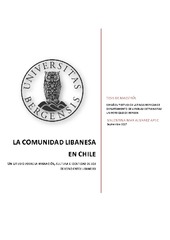La comunidad Libanesa en Chile. Un estudio sobre la migración, cultura e identidad de los descendientes Libaneses
Master thesis
Permanent lenke
https://hdl.handle.net/1956/16762Utgivelsesdato
2017-10-06Metadata
Vis full innførselSamlinger
Sammendrag
This study focuses on the process of integration of the current Lebanese community in Chile. This community emerged as a result of several migratory flows, arriving in Chile from the territories around Mount Lebanon. These waves began in the end of the 19th century, under the reign of the Ottoman Empire. Once the immigrants arrived in Chile, they were expected to enter processes of integration and assimilation into the receiving society. Initially, this was of great challenge because the Arab immigrants were rejected and frowned upon by the Chilean state and elite. In spite of this, the presence and influence of the Arab and Lebanese Colony, over time had a greater influence in the socioeconomic scope of the country, obtaining a higher status after raising national industry during the financial crisis of the early 20th century. The establishment of ethnic communities in this period allowed these immigrants to access a place that allowed them to express their traditions, language, religion and culture, thus allowing them to retain their ethnic identity. This study investigates the historical roots of the Lebanese community in Chile through literary works and personal revelations obtained through interviews with descendants of the immigrants. Qualitative data were collected form 10 participants belonging to different generations of descent in Chile. The data collected were also used to examine their personal perceptions of the importance of cultural heritage and the influence it has had in assessing their self-identification. The study uses to some extent Phinney’s Multigroup Ethnic Identity Measure (MEIM) (1992), to explore the level of adaptation of the participants in Chilean society. Here, it was examined whether they recognized their ethnic identity, whether they had positive feelings towards their group and whether they participated in events with members of their ethnic group. The information retrieved gives an indication of the integration and assimilation process that immigrants and their descendants have experienced in Chile
